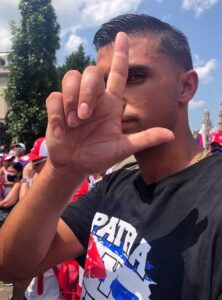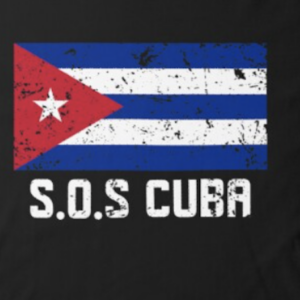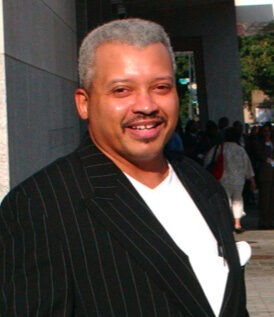We recently saw on TV newscasts the riveting video of many Cuban people taking to the streets to protest food shortages, mishandling of the pandemic, repression of dissent, and misappropriation or denial of goods and services by that island nation’s Communist regime.
A few weeks ago here in Washington, we saw firsthand many protesters marching to the White House and the Cuban embassy to support the Cubans.
Among the sights a few blocks from the White House was a dark-colored pickup truck featuring an inscription on the doors, “I am an anti-communist. Are you?” We saw protesters wearing “Cuban Lives Matter” t-shirts.
Street vendors sold “#SOS CUBA” t-shirts on the spot. Cuban flags were plentiful.
But this account also is about symbolism and patriotism in a broader sense.
During the just-concluded Summer Olympics, Tamyra Mensah-Stock — the first U.S. Black woman to win a gold medal in wrestling — created headlines when she rejoiced in being an American. Draped in a U.S. flag during her news conference in Tokyo, a teary-eyed Mensah-Stock, whose father is an immigrant from Ghana, bellowed, “I love representing the U.S. I freaking love living there. I’m so happy I get to represent the USA.”
You know who else displayed the American flag? That aforementioned pickup truck featured Cuban and U.S. flags; so did some of those Cuban folk who protested perilously in their homeland. Their relatives and sympathizers came to Washington on their behalf, many of them Cuban Americans and many of them the sons and daughters of Cuban exiles.
Such as Renzo Guinovart, 26, a free-diving, spearfisherman based in South Florida.
“Like most immigrants, Cubans leave their homeland in pursuit of freedom and a better life for themselves and their families,” Guinovart explained to InsideSources. “People emigrate from all around the world to the USA in pursuit of freedom and a better life, just like Tamyra’s father did, as did my own father from Cuba.
“Deep in our hearts, we feel a void that is expanded when we witness all the hardships our homeland’s citizens continue to experience and have always experienced. We can only fill that void with the hope for a freer and better life for our people in our home country. That’s why many of the Cubans protesting had the U.S. flag and the Cuban flag — to show solidarity for the freedom that Cuban Americans currently have, and the hope of Cuba having the same freedoms one has in the USA.”
Guinovart said his father fled Cuba on an inner-tube raft in 1992 during Hurricane Andrew, ultimately saved by the U.S. Coast Guard.
Mensah-Stock surely caught many viewers off-guard, and probably with this musing: “Look at this, a black person actually is professing love for the USA,” which defies the usual, approving liberal media narratives of constant Black American protests against the United States.
Many will view Mensah-Stock as an antidote to controversial black hammer thrower Gwen Berry, who refused to acknowledge the U.S. flag and national anthem during the Olympic Trials as part of her social-justice cause (she didn’t medal in Tokyo, meaning no protest on the medal stand).
And surely, conservatives will champion Mensah-Stock as a patriotic person of color who doesn’t demonize the U.S., especially important with midterm elections looming in 2022.
True elections are an exercise that’s absent for Cubans; so are such life choices as homeownership or liberties granted by the inalienable Bill of Rights many Americans take for granted. Even mail and airports are points of contention because as Guinovart pointed out, “Try sending money or taking goods — like an Xbox — to Cuba and see what happens.”
Also, the Cuban government’s disruption of Internet access has intermittently put the kibosh on communication/media platforms.

A much suppressive rigamarole of black market taxation, censoring, and confiscation, indeed.
As one millennial protester displaying a Cuban flag told InsideSources, “The black market in Cuba is like a flea market in the United States.”
These happenings are slices of the slogan espoused by the Cuban government: “patria o muerte,” meaning “homeland or death.” That’s why protester Guinovart, a White Cuban American, wore a t-shirt bearing the anti-slogan: “patria y vida,” meaning “homeland and life.”
Ninety miles off the South Florida coast, the Cuban people simply are seeking what Berry and Mensah-Stock already possess — the “L” word.
We see protesters worldwide use their forefinger and thumb to form that letter “L,” the symbol for “libertad,” the Cuban cry for “liberty and freedom.”


